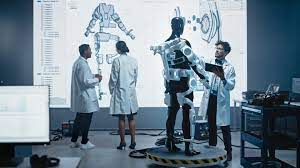
Certainly! Below is an overview of Biomedical Engineering, including key aspects and a syllabus typically followed in India:
Key Aspects:
- Biomedical Instrumentation: Understanding the principles and design of medical devices and instruments used in healthcare settings, including patient monitoring systems, imaging equipment (such as MRI and CT scanners), diagnostic devices, and therapeutic devices.
- Biomechanics: Study of the mechanical principles of biological systems, including human anatomy, physiology, and movement. Biomechanics is applied in the design of prosthetics, orthotics, medical implants, and assistive devices.
- Biomaterials: Exploration of materials used in biomedical applications, including metals, polymers, ceramics, and composites. Understanding the properties, biocompatibility, and interactions of biomaterials is essential for the design of medical implants, tissue engineering scaffolds, and drug delivery systems.
- Medical Imaging: Study of various medical imaging modalities such as X-ray, ultrasound, MRI (Magnetic Resonance Imaging), CT (Computed Tomography), and PET (Positron Emission Tomography). Biomedical engineers learn about image acquisition, processing, analysis, and interpretation for diagnostic and research purposes.
- Biomedical Signal Processing: Analysis and processing of physiological signals such as ECG (Electrocardiography), EEG (Electroencephalography), EMG (Electromyography), and medical images. Signal processing techniques are used to extract relevant information, detect abnormalities, and assist in clinical diagnosis.
- Biomedical Systems and Devices: Design and development of medical devices and systems for therapeutic and diagnostic purposes. This includes wearable devices, implantable devices, lab-on-a-chip systems, and assistive technologies for healthcare applications.
- Biological and Biochemical Engineering: Integration of engineering principles with biological and biochemical processes for applications such as bioprocessing, biofuels production, bioremediation, and pharmaceutical manufacturing. Biomedical engineers study cellular and molecular biology, genetics, and biochemistry to understand biological systems and develop biotechnological solutions.
- Rehabilitation Engineering: Design of devices and technologies to assist individuals with disabilities and enhance their quality of life. This includes prosthetics, orthotics, mobility aids, communication devices, and sensory aids tailored to the needs of individuals with physical or cognitive impairments.
- Regulatory Affairs and Healthcare Standards: Understanding regulatory requirements, quality standards, and ethical considerations governing the development, testing, and commercialization of medical devices and technologies. Biomedical engineers ensure compliance with regulatory agencies such as the FDA (Food and Drug Administration) and adhere to ethical guidelines in biomedical research and practice.
- Clinical Engineering and Healthcare Management: Application of engineering principles in healthcare settings to optimize the use of medical equipment, ensure patient safety, and improve healthcare delivery. Biomedical engineers may work in hospital settings, medical device companies, regulatory agencies, or healthcare consulting firms.
Syllabus (Typically Followed in India):
- Engineering Mathematics:
- Calculus
- Differential Equations
- Linear Algebra
- Probability and Statistics
- Basic Sciences:
- Physics
- Chemistry
- Biology
- Biochemistry
- Engineering Mechanics:
- Statics and Dynamics
- Strength of Materials
- Electrical and Electronics Engineering:
- Circuit Theory
- Electronics Devices and Circuits
- Biomechanics:
- Human Anatomy and Physiology
- Biomechanics of Human Movement
- Orthopedic Biomechanics
- Biomaterials:
- Introduction to Biomaterials
- Properties of Biomaterials
- Biocompatibility
- Biomedical Instrumentation:
- Medical Sensors and Transducers
- Biomedical Signal Processing
- Imaging Techniques in Medicine
- Medical Imaging:
- X-ray Imaging
- Ultrasound Imaging
- MRI and CT Imaging
- Biomedical Systems and Devices:
- Design of Medical Devices
- Biomedical Implants
- Wearable Health Monitoring Systems
- Regulatory Affairs and Healthcare Standards:
- Medical Device Regulations
- Quality Management Systems
- Ethical Issues in Biomedical Engineering
- Rehabilitation Engineering:
- Prosthetics and Orthotics
- Assistive Technologies
- Rehabilitation Robotics
- Biological and Biochemical Engineering:
- Cell and Molecular Biology
- Genetics and Genomics
- Enzyme Technology
- Clinical Engineering and Healthcare Management:
- Healthcare Systems and Management
- Hospital Equipment Management
- Patient Safety and Quality Improvement
- Project Work and Industrial Training:
- Students typically undertake a project related to biomedical engineering in their final year, where they apply their knowledge and skills to solve a real-world problem or develop a biomedical device or system. They may also undergo industrial training or internships in hospitals, research labs, or medical device companies to gain practical experience in biomedical engineering applications.
This syllabus provides students with a comprehensive understanding of biomedical engineering principles and prepares them for careers in healthcare technology, medical device industry, research institutions, and regulatory agencies. Graduates in this field have the opportunity to contribute to advancements in healthcare, improve patient outcomes, and enhance the quality of life through innovative biomedical technologies and solutions.
